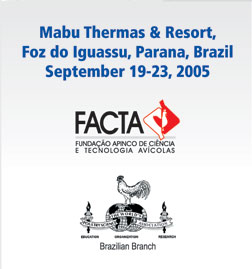| |
Contributed
Papers: Oral Presentations
Vaccines
In Ovo and Dietary Modulation
of Host Intestinal Immunity and its Subsequent Effects
on Coccidiosis
Rami A. Dalloul,1,2,* Hyun S. Lillehoj1,#
and John A. Doerr2
1Animal Parasitic Diseases Laboratory, Animal and
Natural Resources Institute, USDA-ARS, Beltsville,
MD 20705, USA
2College of Agriculture and Natural Resources, University
of Maryland, College Park, MD 20742, USA
ABSTRACT
Various agents of known influence on the mucosal immune
system were evaluated as immunomodulators in poultry
in response to coccidial infections. These included
vitamin A, probiotics, and synthetic CpG oligodeoxynucleotides
(ODNs). Vitamin A deficiency impaired the gut immune
defenses of broiler chickens, which are best characterized
by alteration in intraepithelial lymphocyte (IEL) subpopulations,
mainly CD4+ T cells, resulting in increased susceptibility
to coccidiosis. Conversely, supplementing broiler diets
with a Lactobacillus-based probiotic stimulated the
local immune system and improved resistance to Eimeria,
as shown in a 4-fold reduction in oocyst shedding. Further
investigation on the probiotic effects demonstrated
that probiotic-fed chickens shed fewer oocysts than
chickens without probiotic even in vitamin A-deficient
birds, thus confirming improved resistance to coccidiosis.
Studies with other immunoprotective agents involved
in vitro, in vivo, and in ovo testing of a number of
CpG ODNs. Several CpG ODNs including D19 and 2006 induced
strong IL-6 and nitric oxide secretion by HD11 cells.
Intracellular killing of Salmonella enteritidis was
also increased in ODN 2006-activated HD11 cells. Also,
in vivo CpG treatment with ODN 2006 enhanced birds’
resistance to coccidiosis in a normally susceptible
chicken strain (TK), as shown by reduced oocyst shedding
and improved weight gain during E. acervulina infection.
Further, in ovo vaccination with CpG ODNs and an Eimeria
recombinant microneme protein (MIC2), alone or in combination,
showed positive effects on susceptibility to coccidiosis.
In ovo injection of ODNs D19 and 2006 alone reduced
oocyst shedding, but did not affect weight gain during
E. acervulina infection. When co-administered with MIC2,
both ODNs reduced oocyst shedding; however, only ODN
D19 plus MIC2 consistently improved weight gain. Also,
vaccinating with ODN 2006 or MIC2 protein curtailed
oocyst shedding, but did not enhance weight gain in
E. tenella-infected birds. Collectively, these agents
demonstrated immunoenhancing and adjuvant effects during
Eimeria infections. However, regulation of immune responses
is extremely complex and complete knowledge of how the
immune system responds to Eimeria infections requires
more research.
*Presenting author
#Corresponding author: hlilleho@anri.barc.usda.gov
back | print
|
|
